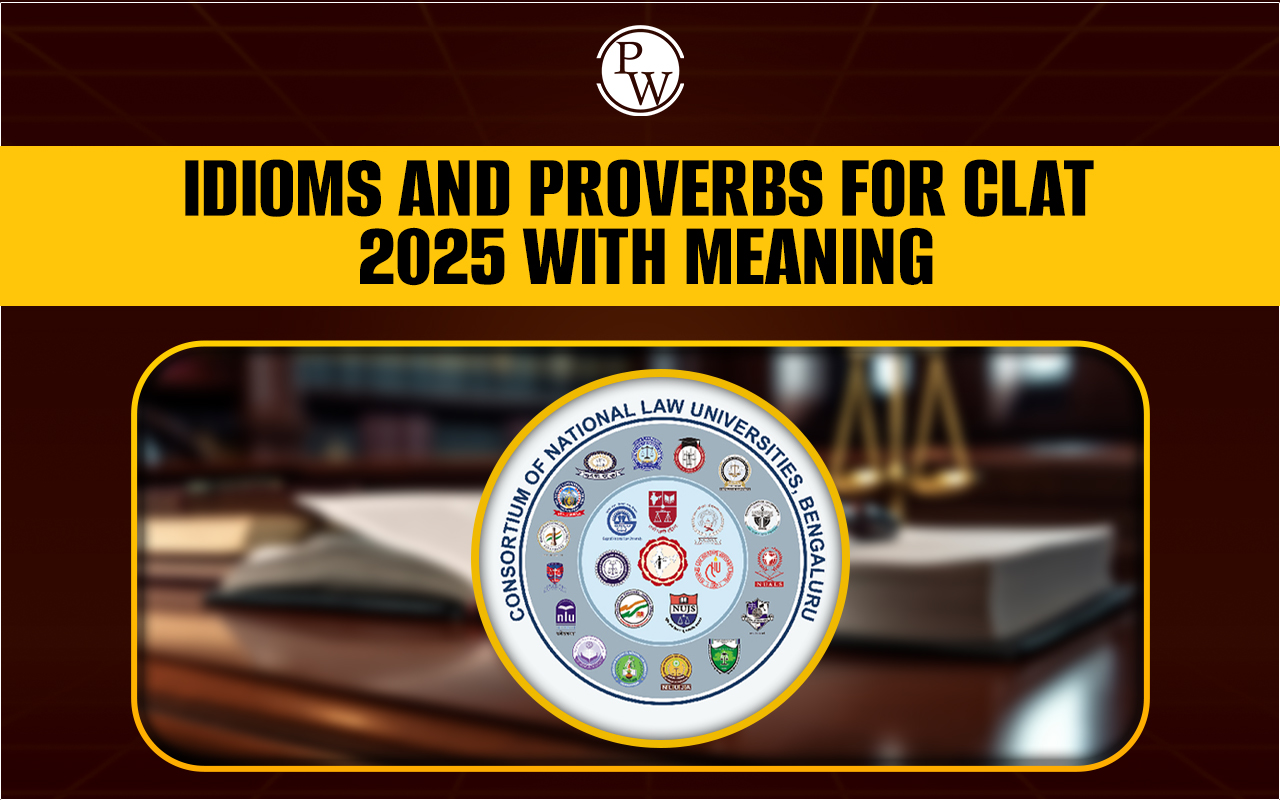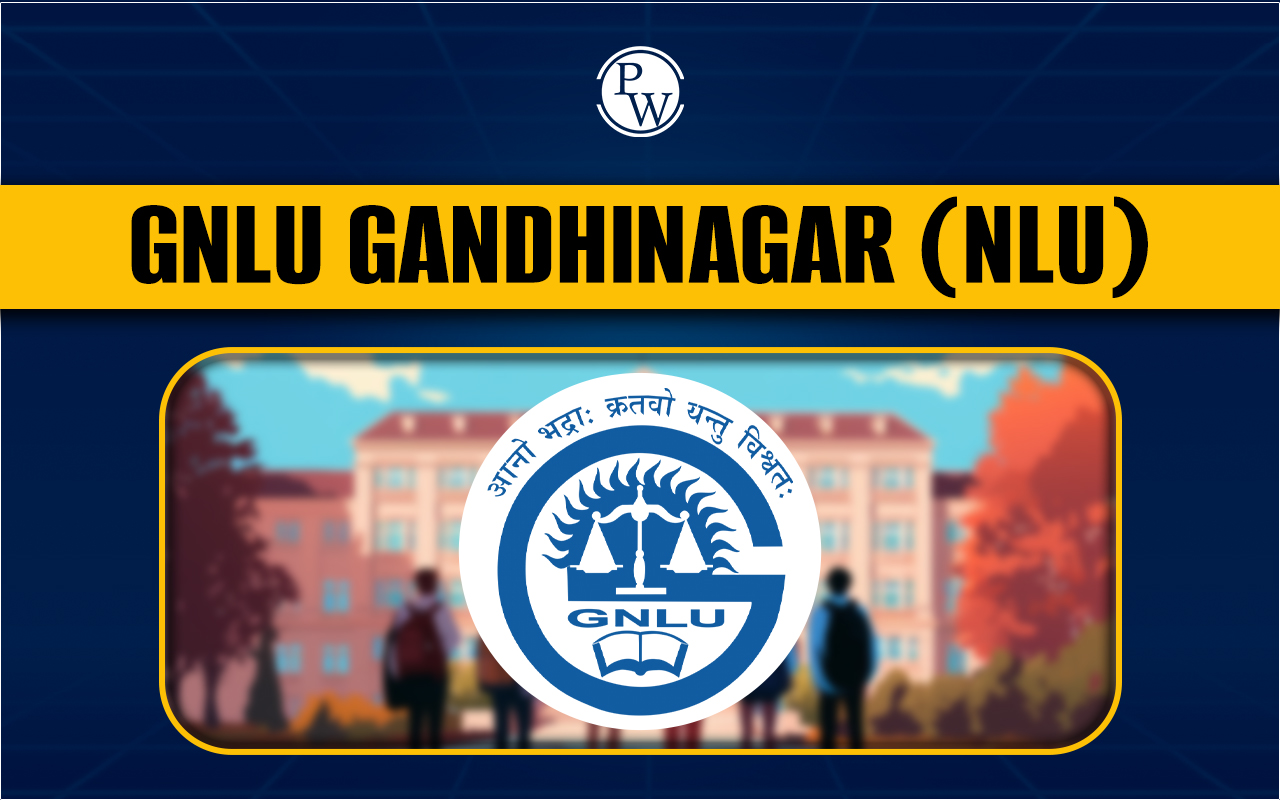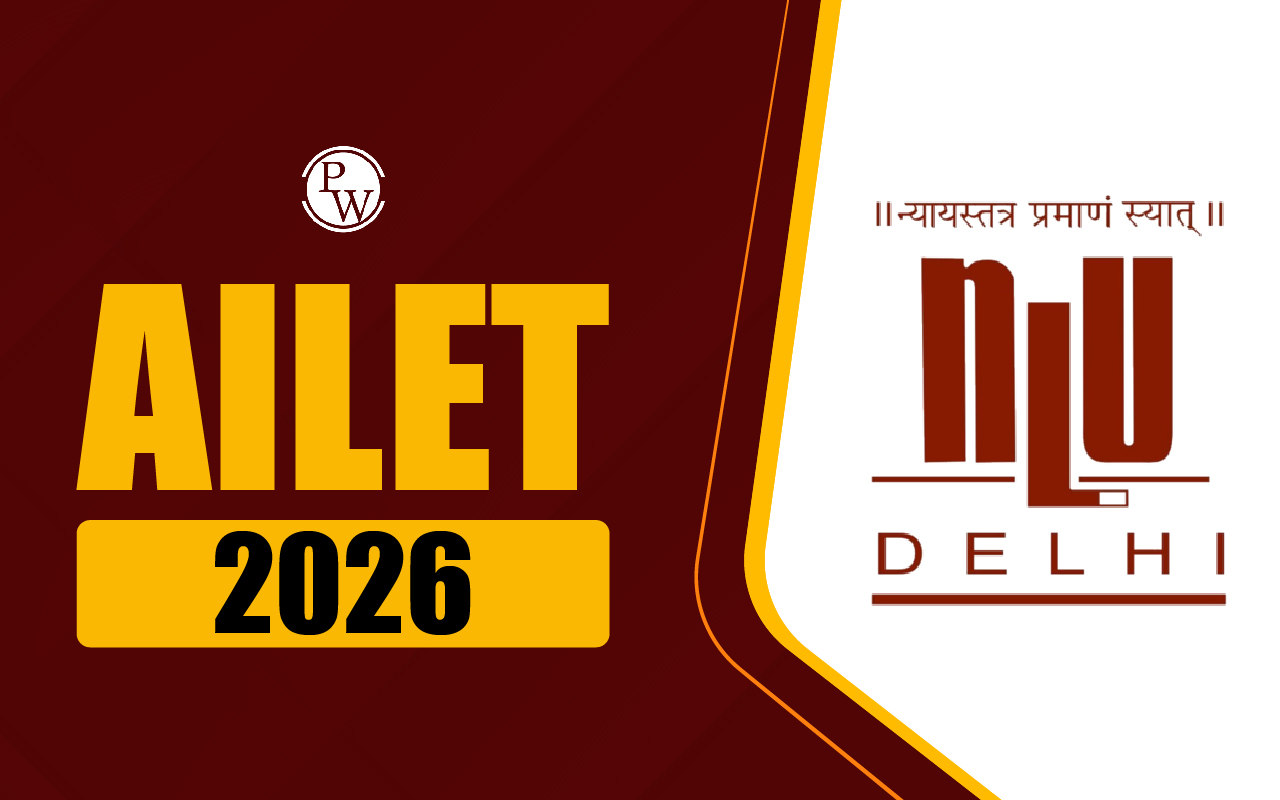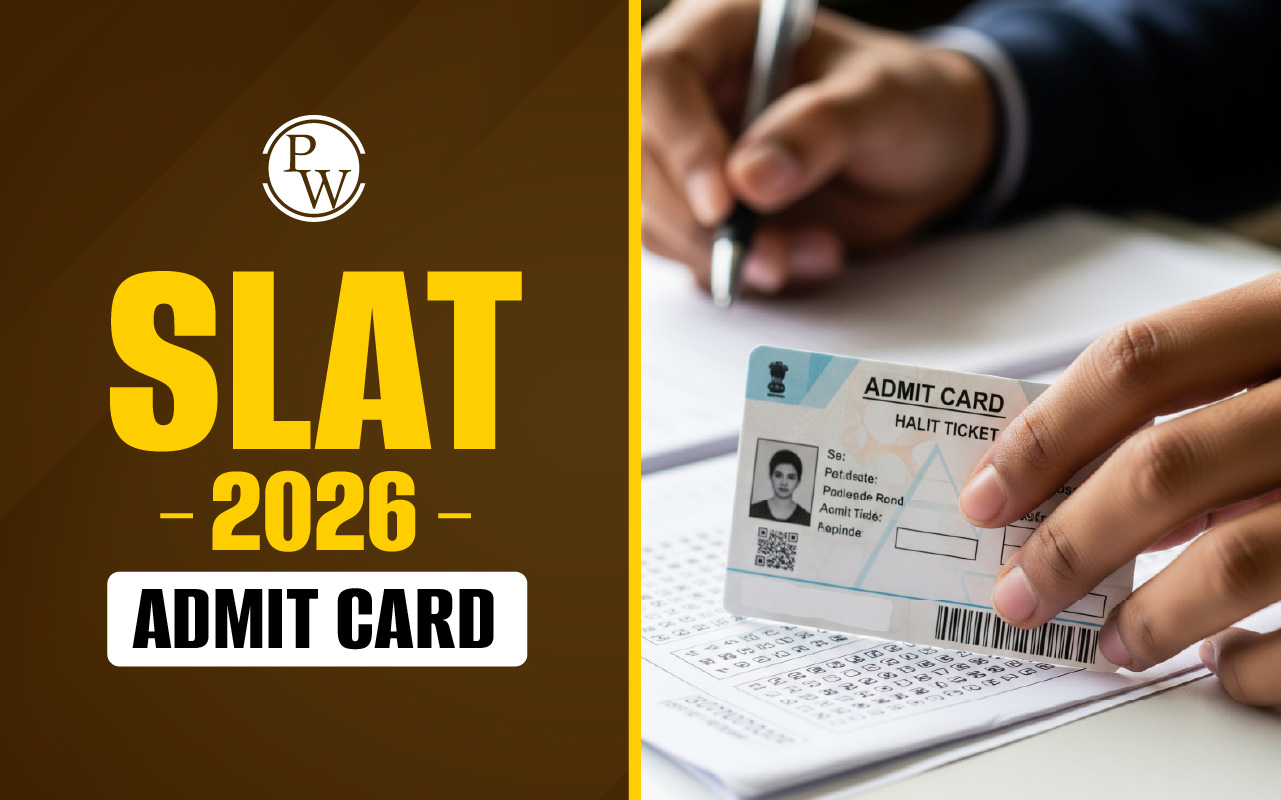

Idioms and Proverbs for CLAT : The Common Law Admission Test (CLAT) is one of India's most competitive entrance exams, granting admission to National Law Universities (NLUs). CLAT 2026 is set to take place in December 2025. One key component of the CLAT English Language section is its focus on idioms and proverbs, and having a solid grasp of these can significantly enhance your score in this section. Idioms and proverbs for CLAT often appear in questions related to reading comprehension, verbal reasoning, and vocabulary, making them an essential part of your preparation.
In this guide, we will explore the idioms and proverbs for CLAT and Significance 2026 and the key differences between the two. By honing your understanding of idiomatic expressions and timeless proverbs, you will improve your familiarity with this critical area, setting you up for a stronger performance in the CLAT exam.Checkout Law Books from PW Store
What is an Idiom?
An idiom is a phrase or expression whose meaning is not easily deduced from the individual words it comprises. Idioms often convey a figurative meaning that differs from their literal interpretation, making them unique to a particular language or culture. Common examples include phrases like "kick the bucket," which means to die, and "break the ice," meaning to initiate conversation in a social setting.What is a Proverb?
A proverb is a concise and popular saying that conveys a general truth or offers advice based on common sense or practical experience. Proverbs often use metaphorical language to express their messages, making them memorable and impactful. For example, "A stitch in time saves nine" suggests that addressing a problem early can prevent it from worsening, while "Actions speak louder than words" emphasizes that what one does is more significant than what one says.Difference between Idioms and Phrases
The difference between idioms and phrases is an important aspect of understanding language nuances. While both consist of groups of words, idioms have meanings that are not directly related to the individual words, often requiring cultural context for comprehension. In contrast, phrases convey a more literal meaning derived from their components. The following table highlights the key differences between idioms and phrases.| Criteria | Phrases | Idioms |
|---|---|---|
| Meaning | Derived from the combination of its individual words, conveying a literal meaning. | Figurative expressions whose meanings cannot be deduced from the individual words. |
| Structure | A grammatical unit that can serve various functions within a sentence (e.g., noun phrase, verb phrase). | Fixed expressions with unique meanings that often require cultural or contextual understanding. |
| Usage | Used as components of sentences to express specific ideas or actions. | Add color and expressiveness to language, often reflecting cultural nuances. |
| Examples | "The sky is very cloudy today." | "Kick the bucket," meaning to die. |
Importance of Idioms and Proverbs in CLAT 2026
The English Language section accounts for 20% of the CLAT marks, making it crucial for success. A significant component of this section is Idioms and Proverbs for CLAT. Mastering these expressions can provide an edge over fellow law students, as they enhance writing, making it more engaging and appealing to readers. Therefore, focusing on Idioms and Proverbs for CLAT is essential for performing well in this section.- Enhances Language Proficiency: Understanding Idioms and Proverbs for CLAT demonstrates a strong grasp of the English language. This is vital for the CLAT exam, where language comprehension is tested extensively. A solid understanding of idiomatic expressions reflects your ability to use language effectively and accurately.
- Improves Communication Skills: Incorporating Idioms and Proverbs for CLAT into your writing and speaking makes your communication more impactful and engaging. Whether in the exam or in future legal practice, the ability to use idiomatic expressions correctly will make your arguments clearer and more persuasive. Effective communication is a key skill for any law student, and proficiency in idioms and proverbs is part of this.
- Boosts Comprehension: Many passages in the CLAT English section contain Idioms and Proverbs for CLAT. Familiarity with these expressions will help improve your reading comprehension, as you'll be able to quickly grasp the meaning of idiomatic phrases in context. This understanding will help you answer comprehension questions more accurately and efficiently.
- Adds Depth to Writing: Using Idioms and Proverbs for CLAT can enrich your essays and responses. These expressions showcase your creativity and command of the language, making your answers stand out to evaluators. Whether in descriptive writing or argumentative essays, idiomatic phrases add flair and sophistication, helping you express complex ideas more clearly.
- Cultural Insight : Idioms and Proverbs for CLAT often reflect cultural nuances and societal values. Understanding these expressions can give you deeper insights into the context of legal texts, discussions, and case studies. This cultural awareness is valuable in the study of law, where understanding societal influences can impact legal interpretations.
Most Important Idioms and Proverbs for CLAT 2026 with Meaning
As you prepare for CLAT 2026, mastering Idioms and Proverbs for CLAT is crucial for excelling in the English Language section. This section assesses your comprehension, vocabulary, and ability to use language effectively, and understanding idiomatic expressions and proverbs can significantly improve your performance. Here are some of the most important Idioms and Proverbs for CLAT 2026, along with their meanings:| Idiom | Meaning |
| Break the ice | To initiate conversation in a social setting. |
| Bite the bullet | To face a difficult situation with courage. |
| Burn the midnight oil | To work late into the night. |
| Caught between a rock and a hard place | To be in a difficult situation with no good options. |
| Hit the nail on the head | To describe exactly what is causing a situation. |
| Let the cat out of the bag | To reveal a secret unintentionally. |
| Once in a blue moon | Something that happens very rarely. |
| Piece of cake | Something very easy to do. |
| The ball is in your court | It is your responsibility to take action. |
| Throw in the towel | To give up or admit defeat. |
| Under the weather | Feeling ill or unwell. |
| Spill the beans | To disclose secret information. |
| Barking up the wrong tree | To pursue a mistaken or misguided course of action. |
| Cost an arm and a leg | To be very expensive. |
| Cut corners | To do something in the easiest or cheapest way, often sacrificing quality. |
| Jump on the bandwagon | To join a popular trend or activity. |
| Keep your chin up | Stay positive and optimistic in difficult situations. |
| Throw caution to the wind | To take a risk without worrying about the consequences. |
| Go the extra mile | To make an extra effort to achieve something. |
| A dime a dozen | Something very common and not unique. |
Important Proverbs for CLAT 2026 With Meaning
As you prepare for CLAT 2026, mastering Idioms and Proverbs for CLAT is crucial for excelling in the English Language section. This section assesses your comprehension, vocabulary, and ability to use language effectively, and understanding idiomatic expressions and proverbs can significantly improve your performance. Here are some of the most important Idioms and Proverbs for CLAT 2026, along with their meanings:| Proverb | Meaning |
| A bird in the hand is worth two in the bush | It’s better to have a sure thing than to risk it for more. |
| Actions speak louder than words | What you do is more important than what you say. |
| All that glitters is not gold | Not everything that looks valuable is so. |
| A penny saved is a penny earned | Saving money is just as important as earning it. |
| When in Rome, do as the Romans do | Adapt to the customs of the place you are in. |
| You can’t judge a book by its cover | Don’t judge someone based solely on appearance. |
| The early bird catches the worm | Taking action early gives you an advantage. |
| Don’t count your chickens before they hatch | Don’t assume success before it happens. |
| A stitch in time saves nine | Addressing a problem early can prevent it from worsening. |
| Too many cooks spoil the broth | Too many people involved can complicate a task. |
| An apple a day keeps the doctor away | Healthy eating can prevent health issues. |
| Better late than never | It’s better to do something late than not at all. |
| Birds of a feather flock together | People with similar interests tend to associate with each other. |
| A picture is worth a thousand words | Images can convey complex ideas more effectively than words. |
| Familiarity breeds contempt | Being too familiar with someone can lead to a lack of respect. |
| Haste makes waste | Rushing can lead to mistakes and poor results. |
| If it ain’t broke, don’t fix it | Don’t try to improve something that already works well. |
| It takes two to tango | Certain actions or situations require the participation of two parties. |
| Out of sight, out of mind | When something is not visible, it is often forgotten. |
Idioms and Proverbs for CLAT FAQs
Why are idioms and proverbs important for the CLAT exam?
Idioms and proverbs are commonly tested in the English Language section of CLAT. Understanding them helps in improving comprehension skills, particularly in identifying the meanings and context of phrases within passages.
What are idioms and proverbs?
Idioms are expressions made up of a group of words that, when used together, have a figurative meaning that is different from their literal meaning
What is figurative language?
Figurative language refers to the use of words or expressions to convey meanings that are different from their literal interpretation. Both idioms and proverbs fall under figurative language because they convey meanings through metaphor, symbolism, or exaggeration rather than through straightforward, literal descriptions
What is the exam pattern for CLAT 2026?
The exam pattern for CLAT 2026 consists of 120 multiple-choice questions divided into five sections: English Language, Current Affairs & General Knowledge, Legal Reasoning, Logical Reasoning, and Quantitative Techniques. Candidates will have 120 minutes to complete the exam, with a marking scheme of +1 for each correct answer and a deduction of 0.25 marks for each incorrect answer.
How can I prepare for CLAT 2026?
To prepare for CLAT 2026, focus on improving reading comprehension, general knowledge, legal reasoning, and logical thinking. Practice with mock tests, previous year’s papers, and time management strategies to build confidence for the exam.
Talk to a counsellorHave doubts? Our support team will be happy to assist you!

Free Learning Resources
PW Books
Notes (Class 10-12)
PW Study Materials
Notes (Class 6-9)
Ncert Solutions
Govt Exams
Class 6th to 12th Online Courses
Govt Job Exams Courses
UPSC Coaching
Defence Exam Coaching
Gate Exam Coaching
Other Exams
Know about Physics Wallah
Physics Wallah is an Indian edtech platform that provides accessible & comprehensive learning experiences to students from Class 6th to postgraduate level. We also provide extensive NCERT solutions, sample paper, NEET, JEE Mains, BITSAT previous year papers & more such resources to students. Physics Wallah also caters to over 3.5 million registered students and over 78 lakh+ Youtube subscribers with 4.8 rating on its app.
We Stand Out because
We provide students with intensive courses with India’s qualified & experienced faculties & mentors. PW strives to make the learning experience comprehensive and accessible for students of all sections of society. We believe in empowering every single student who couldn't dream of a good career in engineering and medical field earlier.
Our Key Focus Areas
Physics Wallah's main focus is to make the learning experience as economical as possible for all students. With our affordable courses like Lakshya, Udaan and Arjuna and many others, we have been able to provide a platform for lakhs of aspirants. From providing Chemistry, Maths, Physics formula to giving e-books of eminent authors like RD Sharma, RS Aggarwal and Lakhmir Singh, PW focuses on every single student's need for preparation.
What Makes Us Different
Physics Wallah strives to develop a comprehensive pedagogical structure for students, where they get a state-of-the-art learning experience with study material and resources. Apart from catering students preparing for JEE Mains and NEET, PW also provides study material for each state board like Uttar Pradesh, Bihar, and others
Copyright © 2025 Physicswallah Limited All rights reserved.










